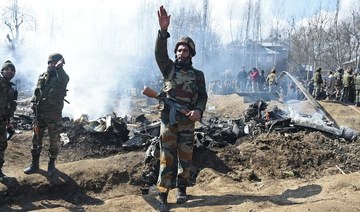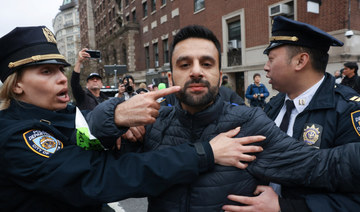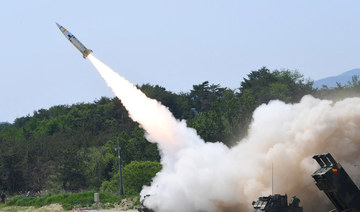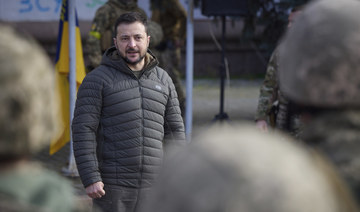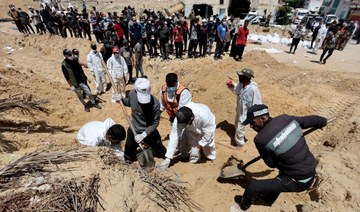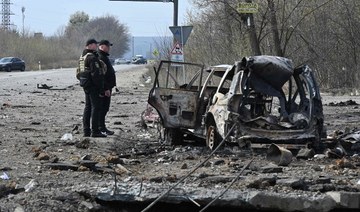SRINAGAR, India: Village council elections are being conducted Thursday in Indian-controlled Kashmir, but the absence of mainstream local politicians leaves worry the polls will install puppets of the central Hindu-nationalist government that revoked the disputed region’s semi-autonomous status in early August.
Officials are hoping the elections of leaders for more than 300 councils will lend credibility amid a political vacuum and contend they will represent local interests better than former corrupt state-level government officials.
But the elections are being boycotted by most political parties, including those whose leaders had been sympathetic to the central government but are now in makeshift jails or under house arrest. India’s main opposition Congress party is boycotting as well, possibly allowing a clean sweep for Prime Minister Narendra Modi’s Bharatiya Janata Party.
The BJP has a very small base in the Kashmir valley, the heart of a decades-old anti-India insurgency in the region of about 12 million people.
Predominantly Muslim Kashmir is split between India and Pakistan, with both countries claiming the region in its entirety. Insurgents in the Indian-controlled portion demand independence or a merger with Pakistan.
In the elections, members of the more than 300 Block Development Councils formed last year will choose chairs. Each block comprises a cluster of villages across Jammu and Kashmir, a state that India’s Parliament downgraded in August to a federal territory, a change that takes effect on Oct. 31.
About 1,000 people are running. In at least 25 councils, candidates are running unopposed.
Most of the candidates and thousands of council members, the electorate for Thursday’s vote, have lived for months in hotels in Srinagar, the region’s main city, over security concerns. In the past, militants fighting against Indian rule have targeted poll contestants.
Officials tout the councils, which will be responsible for allocating government funds, as grassroots democracy.
But observers say the system lacks legitimacy in Kashmir.
Political scientist Dr. Noor Ahmed Baba said the exercise, at least in theory, is an “important layer of democracy” but questioned conducting it in “extremely difficult and abnormal times.”
“When most people are bothered about their basic freedoms and livelihood, facing crushing restrictions, you’ve these elections,” Baba said. “This is more like completing a formality. It looks more like an artificial exercise.”
The council elections held last December were boycotted by separatist leaders and armed rebel groups who challenge India’s sovereignty over Kashmir. Both rebels and separatists in the past have called elections in Kashmir an illegitimate exercise under military occupation.
About 60% of the 21,208 village council seats in the Kashmir valley are vacant because no one ran for them. The winners of another 30% were elected unopposed.
Police chief Dilbagh Singh said authorities have made security arrangements for the Thursday’s elections to be conducted smoothly.
Before downgrading Kashmir’s status, New Delhi sent tens of thousands of additional troops to the already heavily militarized regions, imposed a sweeping curfew, arrested thousands, and cut virtually all communications.
Authorities have since eased some restrictions, lifting roadblocks and restoring landlines and some mobile phones. They have encouraged students to return to school and businesses to reopen, but Kashmiris have largely stayed home, in defiance or fear amid threats of violence.
The Modi government says removing a constitutional provision that had given Kashmir some measure of autonomy since independence from British rule in 1947 was necessary to give rights afforded other Indian citizens, to usher in greater economic development and do away with the sense of separateness that BJP leaders say has cultivated the separatist movement.
But as the crackdown continues, Kashmiris have quietly refused to resume their normal lives, confounding India at their own economic expense.
Shops have adopted new, limited hours of operation in the early morning and evening. Taxi drivers haven’t returned to the roads.
Shailendra Kumar, the chief electoral officer, said the government had planned for the polls in June.
Conducting the polls amid an ongoing crackdown “could be a discussion point,” Kumar said, “but should we delay it for another year? I don’t think so. This is a clear-cut system governed by rules, and rules don’t ask me to gauge mood and sentiments but to facilitate the process.”
Some Kashmiris view the polls cynically, as a move to create a new political elite loyal to the Modi government that found its plans widely rejected in the region.
“Every election here is meant to pull wool over eyes of Kashmiris and create a smoke screen that everything is fine here,” said Mohammed Abdullah, a college teacher. “It’s also meant to convey to the world that India is a democracy and Kashmir is part of this vibrant democracy.”
To Abdullah and other Kashmiris still reeling from the changes in the region, Thursday’s polls suggest the opposite.
India runs Kashmir council vote despite lockdown and boycott
India runs Kashmir council vote despite lockdown and boycott

- Officials are hoping the elections of leaders for more than 300 councils will lend credibility amid a political vacuum
‘Uncommitted’ organizers will join campus protesters in Michigan over Gaza
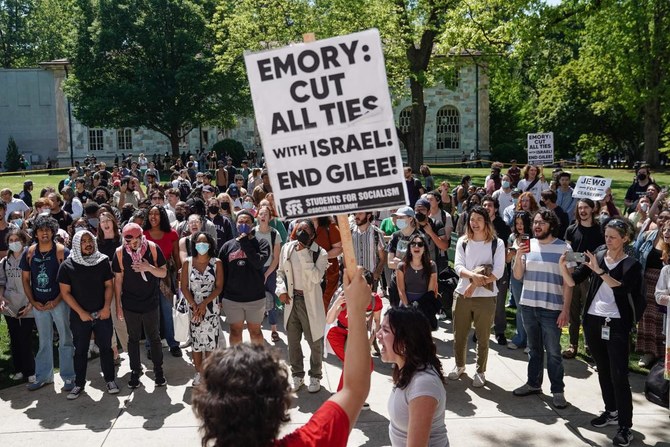
- Student protests in the US over the war in Gaza have intensified and expanded over the past week
- Democrats have become increasingly uneasy over the US support for Israel as the death toll and destruction climb in Gaza
WASHINGTON: Organizers behind the “uncommitted” political movement against President Joe Biden’s staunch support for Israel’s war against Hamas will travel to the University of Michigan’s campus on Thursday to join students protesting the war.
Student protests in the US over the war in Gaza have intensified and expanded over the past week after police first arrested students at Columbia, with so-called Gaza solidarity encampments established at colleges, including Yale, and New York University. Police have been called in to several campuses to arrest hundreds of student demonstrators.
Uncommitted organizers will travel to the University of Michigan’s Ann Arbor campus, they told Reuters, bringing together a political movement that’s disrupted Biden events and amassed hundreds of thousands of votes in Democratic primaries and a student movement that’s drawn students and faculty of various backgrounds.
Biden won Michigan by less than a 3 percent margin in 2020.
Democrats have become increasingly uneasy over the US support for Israel as the death toll and destruction climb in Gaza. A growing revolt inside the Democratic base signifies the challenge Biden faces in bringing together the coalition he needs to defeat Republican frontrunner and former President Donald Trump.
“President Biden is choosing to put his hands over his ears and ignore the hundreds of thousands of people who have already come out against the war at the ballot box,” said Abbas Alawieh, a prominent “Uncommitted” organizer, who is going to Ann Arbor with Layla Elabed, another Michigan organizer.
“Signing into law more money for Israel is sending a clear message to uncommitted voters, young voters that he doesn’t care to engage seriously with our demands to end this war,” he said, referring to the $26 billion in new aid Biden recently approved.
Alawieh said the uncommitted movement has not been coordinating with student groups so far. “We have an electoral focus, but we certainly see the demands of student protesters, who are calling for peace,” he said.
On campuses where protests have broken out, students have issued calls for a permanent ceasefire in Gaza, an end to US military assistance for Israel, university divestment from arms suppliers and other companies profiting from the war, and amnesty for students and faculty members who have been disciplined or fired for protesting.
Biden told reporters on Monday that he condemned both “antisemitic protests” and “those who don’t understand what’s going on with the Palestinians.” Biden campaign spokeswoman Lauren Hitt has said the president “shares the goal for an end to the violence and a just, lasting peace in the Middle East. He’s working tirelessly to that end.”
Trump called the campus protest situation “a mess” as he walked into his criminal trial in New York.
The uncommitted movement amassed sizable vote totals in Michigan, Minnesota and Hawaii primaries and had won 25 delegates as of the beginning of April. They are preparing to target the Democratic National Convention in Chicago in August, where Biden is expected to be nominated.
Polls show Biden and Trump running neck-and-neck ahead of their Nov. 5 election rematch nationally. Biden’s 2020 victory was due to narrow wins in key swing states like Michigan.
US nudges Germany on long-range missiles for Ukraine
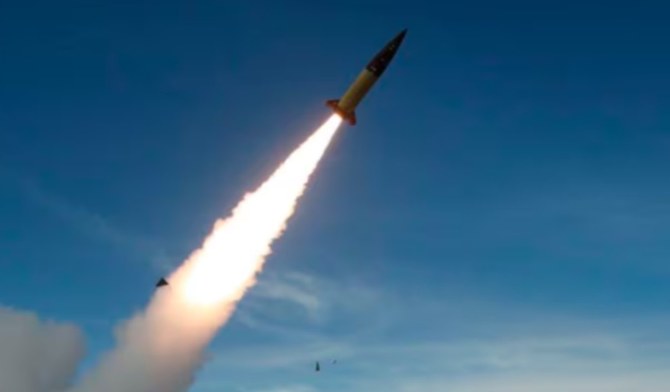
- Washington confirmed the day before that it had sent Ukraine a variant of the ATACMS missile with a range of 300 kilometers
- “In terms of Taurus... this is a decision for Germany,” a senior US defense official told journalists
WASHINGTON: The United States hopes decisions by it and allied countries to send long-range missiles to Ukraine may encourage similar action by Germany, which has so far refused to provide its Taurus missiles, a US official said Thursday.
Washington confirmed the day before that it had sent Ukraine a variant of the ATACMS missile with a range of 300 kilometers (190 miles), while France and Britain have respectively supplied SCALP and Storm Shadow missiles, both of which have a range of about 250 kilometers.
“In terms of Taurus... this is a decision for Germany,” a senior US defense official told journalists when asked if the provision of long-range ATACMS could clear the way for Taurus missiles to be sent to Kyiv.
“But certainly the US provision of ATACMS as well as prior decisions by the UK and France to provide long-range cruise missiles, we would certainly hope that this would be a factor,” the official said, speaking on condition of anonymity.
Kyiv has long pushed for Germany to provide it with Taurus missiles — which can reach targets up to 500 kilometers away — to help its fight against invading Russian forces.
But Berlin has declined to send the missiles, fearing that it would lead to an escalation of the more-than-two-year-old conflict.
Moroccan man guilty of murdering man in UK in revenge for Gaza
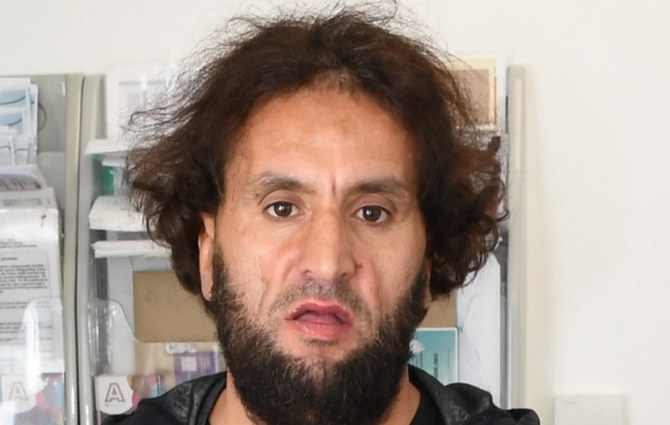
- Ahmed Alid killed his 70-year-old victim after approaching him from behind
- After his arrest, he told detectives he had committed the acts because of the conflict in Gaza, and in revenge for Israel killing innocent children
LONDON: A Moroccan man who stabbed to death a passer-by in the street in northeast England in what he later told police was revenge for Israeli action in Gaza was found guilty of murder on Thursday.
Ahmed Alid, 45, who had sought asylum in Britain, killed his 70-year-old victim after approaching him from behind on a road in Hartlepool the early hours of Oct. 15 last year, having previously attacked his housemate with two knives, prosecutors said.
After his arrest, he told detectives he had committed the acts because of the conflict in Gaza, and in revenge for Israel killing innocent children, blaming Britain for creating Israel, Britain’s Crown Prosecution Service (CPS) said.
Alid said if he had had a machine gun, and more weapons, he would have killed more people.
“By his own admission, Ahmed Alid would have killed more people on that day if he had been able to,” Nick Price, Head of the CPS Special Crime and Counter Terrorism Division, said in a statement.
“Whatever his views were on the conflict in Gaza, this was a man who chose to attack two innocent people with a knife, and the consequences were devastating.”
Alid had first used two knives to attack his sleeping housemate, to whom he had become aggressive after learning of his conversion to Christianity, stabbing him six times while shouting “Allahu Akbar,” or “god is greatest,” the CPS said.
The 32-year-old housemate, one of five asylum seekers who shared the property, managed to fight him off and another occupant came to his aid. Alid left the house with one of the knives and walked toward the center of Hartlepool.
He passed Terence Carney on the opposite side of the road before circling back and attacking him from behind, stabbing him six times in the chest, abdomen and back. Carney died shortly after police arrived.
Following his interview with police, he attacked the two female detectives, with one suffering injuries to her shoulder and wrist.
He was found guilty at Teeside Crown Court of murder, attempted murder and two counts of assaulting an emergency worker. He will be sentenced on May 17, when the judge will decide if his actions were related to terrorism.
India dismisses US human rights report as ‘deeply biased’
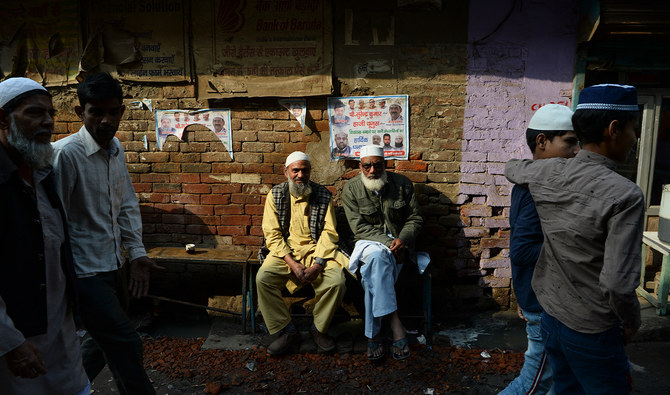
- Report found “significant” abuses in India’s Manipur state and attacks on minorities, dissenters
- India’s foreign ministry spokesperson says New Delhi does not attach any “value” to the report
NEW DELHI: New Delhi said on Thursday it does not attach any value to a US State Department report critical of human rights in India, and called it deeply biased.
The annual human rights assessment released earlier this week found “significant” abuses in India’s northeastern Manipur state last year and attacks on minorities, journalists and dissenting voices in the rest of the country.
Asked about it, Indian foreign ministry spokesperson Randhir Jasiwal told journalists on Thursday that the report “as per our understanding, is deeply biased and reflects a very poor understanding of India.”
“We attach no value to it and urge you to also do the same,” Jaiswal said.
Responding to a question about the growing protests on US university campuses against Israel’s offensive in Gaza that has killed more than 33,000 people, Jaiswal said that “there has to be the right balance between freedom of expression, sense of responsibility and public safety and order.”
He added that “democracies in particular should display this understanding in regard to other fellow democracies, after all we are all judged by what we do at home and not what we say abroad.”
While India and the US have a tight partnership, and Washington wants New Delhi to be a strategic counterweight to China, the relationship has encountered some minor bumps recently.
In March New Delhi dismissed US concerns over the implementation of a contentious Indian citizenship law, calling them “misplaced” and “unwarranted,” and objected to a US State Department official’s remarks over the arrest of a key opposition leader.
Last year Washington accused Indian agents of being involved in a failed assassination plot against a Sikh separatist leader in the US, and warned New Delhi about it.
India has said it has launched an investigation into Washington’s accusations but there has not been any update about the investigation’s status or findings.
Sweden to send NATO troops to Latvia next year: PM
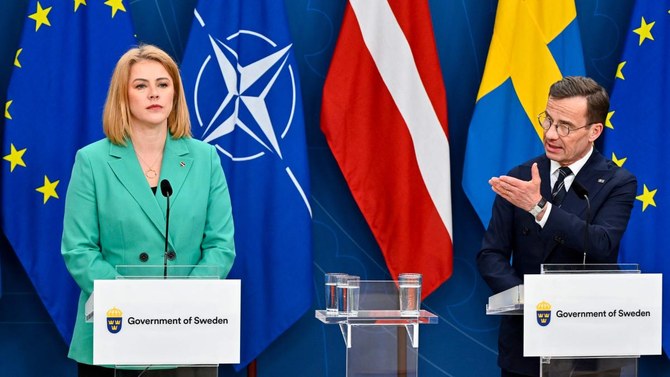
- The Swedish troop contribution was the first to be announced since the Scandinavian country joined NATO in March
- The battalion would be comprised of around 400 to 500 troops
STOCKHOLM: Sweden will next year contribute a reduced battalion to NATO forces in Latvia to help support the Baltic state following Russia’s invasion of Ukraine, Prime Minister Ulf Kristersson said Thursday.
The Swedish troop contribution was the first to be announced since the Scandinavian country joined NATO in March.
Kristersson had in January announced that Sweden would likely send a battalion to take part in NATO’s permanent multinational mission in Latvia, dubbed the Enhanced Forward Presence, aimed at boosting defense capacity in the region.
“The government this morning gave Sweden’s armed forces the formal task of planning and preparing for the Swedish contribution of a reduced mechanized battalion to NATO’s forward land forces in Latvia,” Kristersson told reporters during a press conference with his Latvian counterpart Evika Silina.
He said the battalion, which will be in Latvia for six months, would be comprised of around 400 to 500 troops.
“Our aim is a force contribution, including CV 90s armored vehicles and Leopard 2 main battle tanks.”
“We’re planning for the deployment early next year after a parliament decision,” he said.



